Kosovo
self-declared independent country
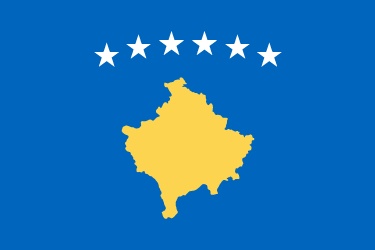
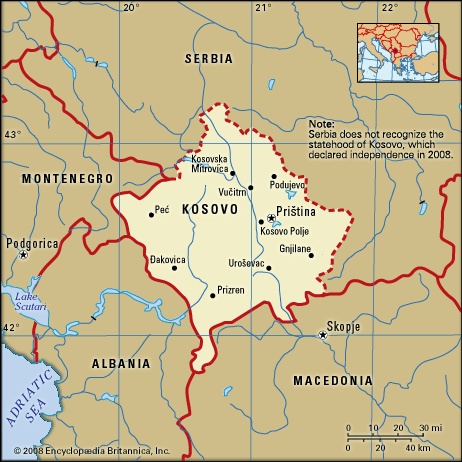
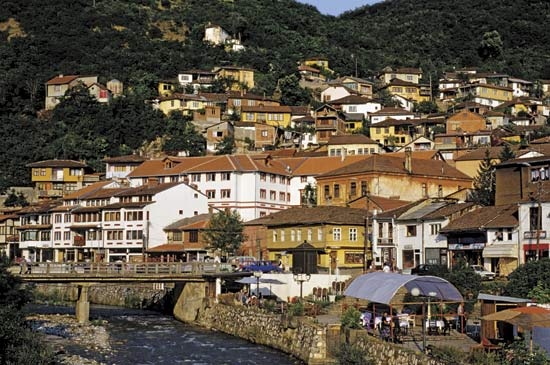 self-declared independent country in the Balkans region of Europe. Although the United States and several members of the European Union (EU) recognize Kosovo's independence, Serbia, Russia, and a number of other countries, including some in the EU, do not. For most of the 20th century, Kosovo was a part of Serbia, one of the constituent republics of Yugoslavia. By the end of the century, however, ethnic Albanians, not Serbs, constituted the bulk of the population. In 1998 a secessionist rebellion in Kosovo escalated into an international crisis, including an air bombardment of Yugoslavia (by then a rump of the former federal state, comprising only Serbia and Montenegro) by the North Atlantic Treaty Organization (NATO) in 1999. Following the restoration of peace, Kosovo was administered by the United Nations (UN), during which time Yugoslavia not only changed its name to Serbia and Montenegro but eventually separated into those independent states. Tensions between Kosovo and Serbia remained high throughout this period, and in February 2008 Kosovo formally declared independence.
self-declared independent country in the Balkans region of Europe. Although the United States and several members of the European Union (EU) recognize Kosovo's independence, Serbia, Russia, and a number of other countries, including some in the EU, do not. For most of the 20th century, Kosovo was a part of Serbia, one of the constituent republics of Yugoslavia. By the end of the century, however, ethnic Albanians, not Serbs, constituted the bulk of the population. In 1998 a secessionist rebellion in Kosovo escalated into an international crisis, including an air bombardment of Yugoslavia (by then a rump of the former federal state, comprising only Serbia and Montenegro) by the North Atlantic Treaty Organization (NATO) in 1999. Following the restoration of peace, Kosovo was administered by the United Nations (UN), during which time Yugoslavia not only changed its name to Serbia and Montenegro but eventually separated into those independent states. Tensions between Kosovo and Serbia remained high throughout this period, and in February 2008 Kosovo formally declared independence.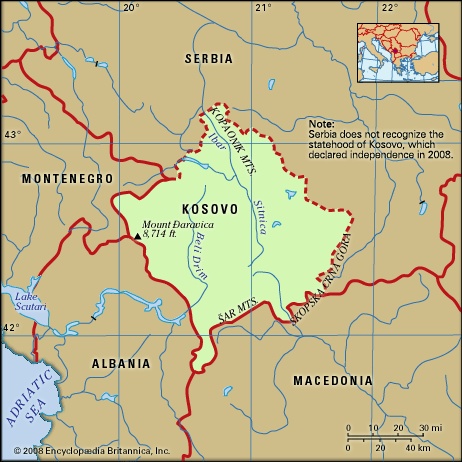 Kosovo is bordered by Serbia to the north and east, Macedonia to the south, Albania to the west, and Montenegro to the northwest. Its terrain consists largely of two intermontane basins. In the east the Kosovo Basin is drained by the northward-flowing Sitnica River, a tributary of the Ibar River. The principal cities in the basin are Priština—the capital and administrative centre—and Kosovska Mitrovica. In the west the Metohija Basin lies along the border with Albania, drained by the southward-flowing Beli Drim River; its principal cities are Peć and Prizren. Kosovo's mineral resources include lignite, asphalt, and nonferrous metals. Its soils are among the most fertile in the Balkans and support the cultivation of grains (wheat, barley, corn 【maize】), fruits and vegetables, and such commercial crops as tobacco. However, Kosovo is one of the least-developed parts of the Balkans.
Kosovo is bordered by Serbia to the north and east, Macedonia to the south, Albania to the west, and Montenegro to the northwest. Its terrain consists largely of two intermontane basins. In the east the Kosovo Basin is drained by the northward-flowing Sitnica River, a tributary of the Ibar River. The principal cities in the basin are Priština—the capital and administrative centre—and Kosovska Mitrovica. In the west the Metohija Basin lies along the border with Albania, drained by the southward-flowing Beli Drim River; its principal cities are Peć and Prizren. Kosovo's mineral resources include lignite, asphalt, and nonferrous metals. Its soils are among the most fertile in the Balkans and support the cultivation of grains (wheat, barley, corn 【maize】), fruits and vegetables, and such commercial crops as tobacco. However, Kosovo is one of the least-developed parts of the Balkans.In the later Middle Ages the Kosovo region lay at the heart of the Serbian empire under the Nemanjić Dynasty. Between the mid-12th and the mid-14th century the region was richly endowed with Eastern Orthodox (Eastern Orthodoxy) monuments, such as the Dečani Monastery (1327–35) with its more than 1,000 frescoes. (In 2004 the monastery was designated a UNESCO World Heritage site, and two years later the site was expanded to include several other monasteries—including Gračanica, with 14th-century frescoes, near Priština—and the Church of the Virgin of Ljeviša.)
In 1389, however, at the Battle of Kosovo (Kosovo, Battle of) fought just west of Priština, an army of the Turkish Ottoman Empire defeated a force of Serbs and their allies. By the mid-15th century the Turks had established direct rule over all of Serbia, including Kosovo. Kosovo had been populated by a mixture of Albanian and Slavic speakers since the 8th century. In the centuries following the Ottoman victory, a significant portion of Kosovo's Christian Serb inhabitants emigrated northward and westward to other territories, while many others converted to Islam. Following the defeat of an Austrian invasion in 1699, during which many Serbs sided with the invaders, many more Serbs joined the retreating Austrian army.
The ethnic balance of the region steadily changed in favour of Albanian speakers, and the abolition in 1766 of the Serbian Orthodox patriarchate at Peć substantially diminished the importance of Kosovo as a Serbian cultural centre. Nevertheless, Kosovo came to symbolize Serbia's golden age of national greatness. A tradition of epic poetry emerged, in which Kosovo represented Serbian national suffering and aspirations. At the same time, ethnic Albanians increasingly identified with the region, and by the late 19th century Prizren had become an important centre of Albanian culture and national consciousness.
Serbia, which had won independence from the Ottoman Empire early in the 19th century, regained control of Kosovo in 1912, and Kosovo entered the new Kingdom of Serbs, Croats, and Slovenes (Serbs, Croats, and Slovenes, Kingdom of) (later renamed Yugoslavia) in 1918 as a part of Serbia. In the 1920s and '30s, Serbia's attempts to resettle Serbs in Kosovo met with resistance from local ethnic Albanians. During World War II, Kosovo was briefly united with neighbouring Albania under Italian patronage. Toward the end of the war, however, Yugoslavia's new communist government crushed a revolt in Kosovo by ethnic Albanians who wanted to unite with Albania. The postwar government of the new federal Yugoslavia granted Kosovo the status of an autonomous region (and later autonomous province) within the republic of Serbia, but it also continued to suppress nationalist sentiments among the region's Albanians.
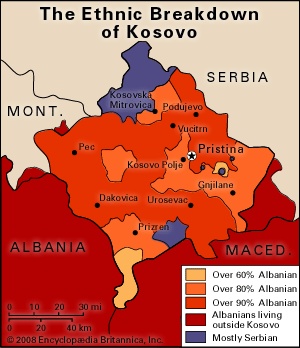 From the mid-1960s the Yugoslav government followed a more tolerant policy of encouraging Albanian national identity and enabling Albanians to advance in the provincial and federal administrations. This Albanization of the province was also stimulated by the rapid departure of Serbs to urban areas. As a result of Serbian migration and higher Albanian birth rates, the Albanian share of the population rose from half in 1946 to three-fourths in 1981 and to four-fifths in 1991, by which time the proportion of Serbs had fallen to about one-tenth.
From the mid-1960s the Yugoslav government followed a more tolerant policy of encouraging Albanian national identity and enabling Albanians to advance in the provincial and federal administrations. This Albanization of the province was also stimulated by the rapid departure of Serbs to urban areas. As a result of Serbian migration and higher Albanian birth rates, the Albanian share of the population rose from half in 1946 to three-fourths in 1981 and to four-fifths in 1991, by which time the proportion of Serbs had fallen to about one-tenth.Under the Yugoslav constitution enacted in 1974, Kosovo's status as an autonomous province was that of a republic in all but name. Sharp rises in international energy prices in 1973 and 1979, however, placed growing strain on the Yugoslav economy, and conflict deepened among republics over the issue of aid to underdeveloped regions. There was serious civil disorder in the province during 1981.
In the intense process of inter-republic bargaining for economic and political advantage, Serbian politicians began to resent the ability of the Kosovars to act together with representatives of other Yugoslav republics, even against Serbian interests. The indignation felt by Serbs over the situation in Kosovo was capitalized on by Slobodan Milošević (Milošević, Slobodan), a rising politician whose manipulation of Serbian grievances helped him to become leader of Serbia's communist party in 1987 and president of the Serbian republic in 1989, thereby dominating the government of Yugoslavia. Soon after becoming president, Milošević stripped Kosovo of its autonomy, and Serbia took direct control of the province's administration. When the province's ethnic Albanians staged violent protests over these measures, Milošević in 1990 sent Yugoslav military units to Kosovo, dissolved the province's assembly, and closed schools in which the Albanian language was used. In an officially unrecognized referendum held in September of that year, the Kosovars voted overwhelmingly to secede from Serbia and Yugoslavia.
The cost to the Yugoslav government in economic aid to the province and the toughness of Serbia's response to Kosovar Albanian nationalism were among the contributing causes of the breakup of the federal Yugoslav state in 1991. In 1992 a new Yugoslav state consisting of only Serbia and Montenegro (the name by which it was known during 2003–06) was created; the component republics ultimately separated in 2006. Kosovo's Albanians, faced with the Yugoslav government's evident willingness to use military force against them, adopted a course of passive, nonviolent resistance to Serbian control. Under the leadership of the pacifist Ibrahim Rugova, they organized their own network of Albanian-language schools and other civil institutions.
The Kosovar Albanians became increasingly frustrated by the failure of their noncooperation campaign to win for them independence or even autonomy from the Serb-dominated Yugoslav government. Though most Albanians remained committed to nonviolence, the Kosovo Liberation Army (KLA), a small ethnic Albanian guerrilla organization that emerged in 1996, began attacking Serbian police and politicians in Kosovo. With arms obtained in Albania, the KLA stepped up its attacks in 1997, prompting the Yugoslav military to stage a major crackdown in the rebel-held Drenica region in early 1998. The brutality of this campaign drove hundreds of new recruits into the KLA's ranks, and by summer widespread fighting had broken out between the KLA and heavily armed Yugoslav and Serbian forces. Yugoslav military tactics also drove thousands of ethnic Albanian villagers from their homes, and by late summer the plight of these refugees had become a source of serious international concern.
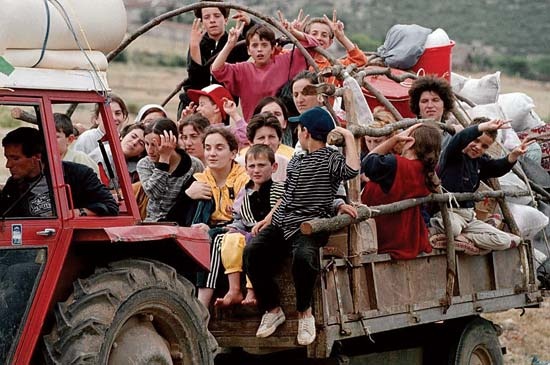 International negotiators, especially from the United States, met repeatedly with Yugoslav and Kosovar Albanian representatives in an attempt to stop the fighting. A cease-fire agreement negotiated in November 1998 had broken down by the end of the year, when the Yugoslav army, with the aid of Serbian forces, launched a major offensive against the KLA. Talks held at Rambouillet, France, in February 1999 had secured no results by mid-March, and NATO (North Atlantic Treaty Organization) soon began an aerial bombardment of selected targets in Yugoslavia. Yugoslav and Serbian forces responded by initiating a widespread campaign of ethnic cleansing against Albanian Kosovars that by June had driven hundreds of thousands of refugees into neighbouring Albania, Macedonia, and Montenegro. The NATO bombardment continued until June, when a peace agreement called for the withdrawal of Yugoslav and Serbian forces from Kosovo and their replacement by NATO peacekeeping troops. Beginning in mid-1999, the UN sponsored an interim administration in Kosovo. As the terms of the peace agreement were being carried out, Kosovar refugees began returning to the province, and Serbs—sometimes facing sporadic reprisals—began to flee the region.
International negotiators, especially from the United States, met repeatedly with Yugoslav and Kosovar Albanian representatives in an attempt to stop the fighting. A cease-fire agreement negotiated in November 1998 had broken down by the end of the year, when the Yugoslav army, with the aid of Serbian forces, launched a major offensive against the KLA. Talks held at Rambouillet, France, in February 1999 had secured no results by mid-March, and NATO (North Atlantic Treaty Organization) soon began an aerial bombardment of selected targets in Yugoslavia. Yugoslav and Serbian forces responded by initiating a widespread campaign of ethnic cleansing against Albanian Kosovars that by June had driven hundreds of thousands of refugees into neighbouring Albania, Macedonia, and Montenegro. The NATO bombardment continued until June, when a peace agreement called for the withdrawal of Yugoslav and Serbian forces from Kosovo and their replacement by NATO peacekeeping troops. Beginning in mid-1999, the UN sponsored an interim administration in Kosovo. As the terms of the peace agreement were being carried out, Kosovar refugees began returning to the province, and Serbs—sometimes facing sporadic reprisals—began to flee the region.Talks initiated by the UN in 2005 on the future of Kosovo led in 2007 to a plan, submitted by a UN envoy, that laid the groundwork for self-rule but stopped just short of full independence. Rapid endorsement of the plan by Kosovar Albanians was countered with intransigent opposition from the Serbian government. Months of further talks between Serbian and Kosovar leaders failed to resolve Kosovo's future status, and by early 2008 Kosovo was determined to secede.
In February 2008 Kosovo formally declared independence. Serbia, backed by Russia, called the declaration illegal. Serbs living in Kosovo largely opposed Kosovar independence as well; they soon elected their own assembly as a direct challenge to Kosovo's new constitution, which took effect in June. In October the UN General Assembly (General Assembly, United Nations), following a request by Serbia, submitted the question of the legality of Kosovo's independence to the International Court of Justice. Meanwhile, Russian objections postponed the withdrawal of the UN mission, which ultimately was expected to transfer its powers of oversight to the EU. The EU finally deployed its mission, known as Eulex, in December. Eulex, made up of about 1,900 officials from a number of European countries, would oversee police, judicial, and customs activities in Kosovo.
- Marcus Whitman
- Marcy, Mount
- Marcy, William L
- Mardals Falls
- Mardaïte
- Mar del Plata
- Marden, Brice
- Mardersteig, Giovanni
- Mardi Gras
- Mardin
- Mardonius
- Marduk
- Mardān
- mare
- Marechal, Leopoldo
- Marechera, Dambudzo
- Mareeba
- Marek's disease
- Maremma
- Marengo, Battle of
- marennes
- Marenzio, Luca
- mare's-tail
- Maret, Hugues-Bernard, Duc De Bassano
- Marett, Robert R.